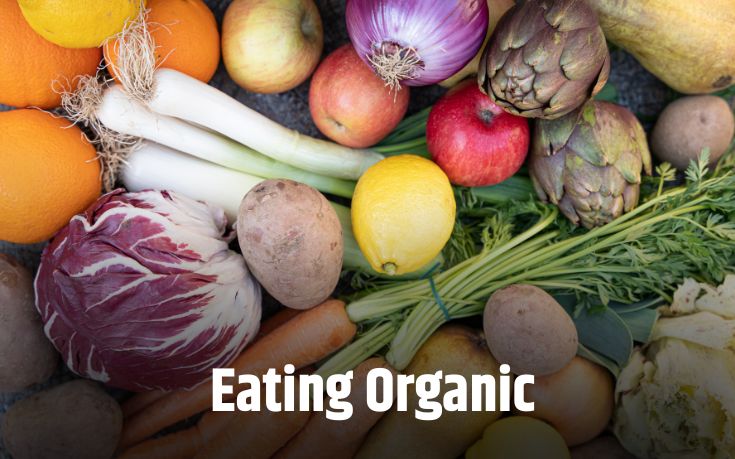The luxury of eating organic can come with a price tag, though. That the merits of organic food are crystal clear—one can be sure of no harmful pesticides, GMOs, or the presence of synthetic additives—is for sure. The only catch here is the back-breaking pocket pinch. Worry not, for here are ways to tap into the benefits of organic eating without breaking the bank. We are presenting here some creative and practical tips for eating organic on a budget.
Eating Organic
Eating organic has gone beyond the edgy; it has reached the level at which even the most health-conscious person from every corner of the world is now a participant. Growing food without the use of synthetic pesticides, fertilizers, or genetically modified organisms (GMOs) means growing food organically; it ensures natural farming that maintains the health of the land and increases its biodiversity.
Not only does it minimize the use of potentially harmful chemical substances, but it also encourages other kinds of practices that ensure friendly environmental sustainability and show respect for animal welfare.
Organic foods are preferred for their nutrients and good taste, which reflects purity and quality. The choice to go organic in food extends beyond personal health to support a responsible decision for the health of our planet and healthy, safe food systems for all generations.
Make Purchases on a Priority Basis
A good suggestion to control costs is to simply buy organic things based on a priority list. The Environmental Work Group puts out an annual list and it gives you an idea of which fruits and vegetables have the highest pesticide residues and those are the items you want to purchase organic if possible.
They also put out a “Clean Fifteen” list with produce that has the least pesticide contamination and you can buy conventional versions of those to save yourself some money.
Eating Organic : Bulk Buying
Products with longer shelf life prove to be economical if bought/scoped in bulk. Most of the organic grains, beans, nuts, seeds, and dried fruits are generally found to be less expensive in bulk. Many grocery stores and online vendors offer such an opportunity within bulk buying – an option that not only will save you money but also be better for the environment by cutting down on individual waste in packaging. Put these in airtight containers and keep them in a cool place to make it last longer in use.
Seasonal Shopping
Another way to economize is through the buying of seasonal produce. Most vegetables and fruits turn out more affordable and fresh in their natural season, rather than if they are bought out of season.
Farmers’ markets are also a great place to source cheaper, seasonal, locally-grown organic produce. Build your meals around what’s in season to ensure you’re not only getting the best financial deal but the best on nutrition as well.
Grow Your Own
You’ll cut down on your grocery bill by growing some of your organic vegetables and herbs.
You don’t even need space; even a small balcony or windowsill can sport pots of herbs, tomatoes, or leafy greens. It gives you full control of what is put into your food. Gardening can also be a rewarding and therapeutic hobby.
Plan and Prepare
Meal planning is one of the greatest bridges to eating organically on a budget. Since a detailed weekly menu can be developed, the shopping list will be equally detailed, thereby saving you from the problem of impulse buying and food wastage on your shelf.
With a meal ahead of time, you will not have to rush out and buy expensive take-out food or convenience foods. This is one of the best ways to save time, money, and food waste: make portions and freeze them.
Look for Sales and Coupons
Sales on organic food and coupons are some of the strengths you can capitalize on; keep your eyes open for this kind of offer on organic products. Many grocery stores have weekly deals related to organic items, plus health food stores tend to combine discounts with loyalty programs on organic food. Several apps and websites offer coupons specifically for organic foods. Combining all these discounts with your shopping list can help you save real cash.
Utilize Community Resources
Community-supported agriculture (CSA) Community-supported agriculture programs allow you to purchase shares in a local farm’s yield. In turn, you receive a fresh, in-season produce box weekly.
It can provide a cost-effective method to gain access to a variety of organic vegetables and fruits. Also, food co-ops and buying clubs frequently provide discounted prices for members on organic products, due to purchasing in bulk and shared member benefits.
Cook from Scratch
Organic foods and food cooked from scratch are cheaper because they are not highly processed and pre-packaged, which usually increases cost. When cooking at home, not only will you save money, but you will also consume healthier food since you are in control of the raw material and food preparation. Simple recipes with basic staples will taste great and offer much nutritional value. Think of hearty soups and stews, stir-fries, and salads.
Eat Less Meat
Organic meat is generally too expensive as compared to conventional types. You could end up saving a lot of money by consuming less quantity of organic meat.
Make more meals from plant sources like lentil soups, bean chili, vegetable stir fry, and grain bowls. Cook meat only at some special events. Buy during a sale and store it for later in the freezer.
Maximize Leftovers
Turning leftovers into new meals is an awesome way to extend your budget. Leftover roast chicken can be turned into chicken salad or chicken soup.
Leftover cooked vegetables can be put inside frittatas or pasta dishes. Creating new dishes using leftovers not only saves one money but also trims the amount of waste that ends up in landfills.
Final Words
It may sound so at first, but it’s not that hard to eating organic on a shoestring budget. Prioritizing, buying in bulk, and taking advantage of seasonal organic produce all add up to affordable organic. Give growing your food, meal planning, and prepping a go, along with showcasing your community spirit.
Still, understand that true value lies in utilization. Make the most of the available resources, and be thoughtful in your choices to reap organic bounty without blowing the budget. Remember, every small step to a healthier diet is a victory. Try one or two of these tips and slowly add more as you become comfortable. Your wallet and health will thank you for it. Embrace the journey toward affordable organic living and enjoy nature’s vibrancy and nutritious foods.





